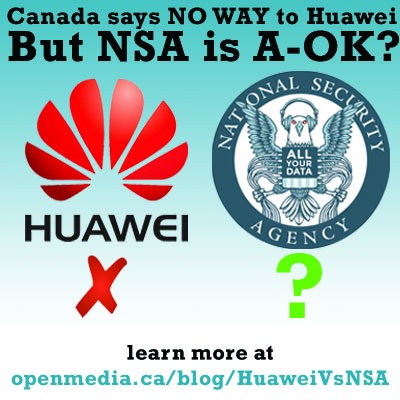What does Ottawa have to say about spying by the NSA?
It’s no secret that China-based Huawei Technologies (pronounced “WAH-way”) has been the subject of national security concerns. Last year, The Globe and Mail obtained government documents detailing Ottawa’s fears around data security in Canadian networks maintained by the controversial telecom giant. This added to concerns raised by the U.K., the U.S., Australia, and others about Huawei’s suspected link to the Chinese government, and the potential for the company to use its equipment to enable spying. As Huawei became increasingly pervasive in our wireless marketplace—the company supplies many Canadian cell phone service providers, including Big Telecom giants Telus and Bell—Canada’s government clearly took the time to examine the potential privacy and national security issues.
As Huawei became increasingly pervasive in our wireless marketplace—the company supplies many Canadian cell phone service providers, including Big Telecom giants Telus and Bell—Canada’s government clearly took the time to examine the potential privacy and national security issues.
So why, then, is Canada’s government not showing equal unease when it comes to the U.S.-based National Security Agency’s (NSA’s) data collection practices, especially given recent revelations about their widespread and invasive nature?
When it came to Huawei, Ottawa, according to the Globe, “took extra measures to safeguard its networks against the risks of hacking or espionage.” Where are those measures now?
It’s a concern that should be raised. As mentioned by tech blogger Peter Nowak, “pretty much every service that runs on cell phones, from email to Facebook to Twitter and so on, routes through the United States.”
Surveillance expert Ronald Deibert echoed this in an interview with the Toronto Star: “There is no border,” he said. “The way telecommunication traffic is routed in North America, the fact of the matter is about 90 per cent of Canadian traffic—no one really knows the exact number—is routed through the United States.”
Adding to that, there’s a strong possibility that Verizon—which, it was revealed, regularly and indiscriminately hands over its customers’ personal data to the NSA—will soon enter Canada’s wireless market.
Given all of this, why is Ottawa so blasé about the possibility of surveillance of Canadians from south of the border?
In an article reacting to the U.S. government’s stated apprehension about allowing Huawei’s services into the country, Forbes’ Simon Montlake reasoned,:There is another line of defence open to Huawei and its erudite defenders. They might point out that U.S. intelligence agencies have routinely obtained reams of data from U.S. telecom companies and have many clever (read: classified) ways to know what you are saying or writing. It would be naive to think that cyber-surveillance isn’t happening, and that powerful governments wouldn’t exploit their knowledge of telecom networks to defend their interests around the world.
And that was written before June 2013, when leaked documents revealed just how out-of-control the NSA’s spying practices have become.
We now know that Canadian spy agency CSEC has been systematically collecting residents’ private information, and has worked in close partnership with other groups including the NSA. Does this explain the government's strange lack of concern about NSA spying in Canada? Isn't it time the government comes clean and tells Canadians exactly what's going on? If you agree, speak out at http://SecretSpying.ca.
Share this image:




 Take action now!
Take action now!
 Sign up to be in the loop
Sign up to be in the loop
 Donate to support our work
Donate to support our work